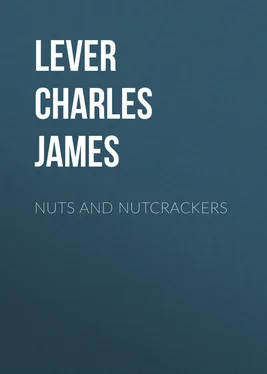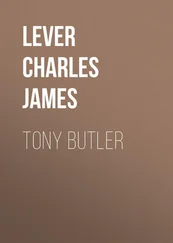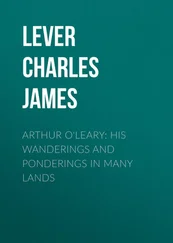Charles Lever - Nuts and Nutcrackers
Здесь есть возможность читать онлайн «Charles Lever - Nuts and Nutcrackers» — ознакомительный отрывок электронной книги совершенно бесплатно, а после прочтения отрывка купить полную версию. В некоторых случаях можно слушать аудио, скачать через торрент в формате fb2 и присутствует краткое содержание. Жанр: foreign_antique, foreign_prose, на английском языке. Описание произведения, (предисловие) а так же отзывы посетителей доступны на портале библиотеки ЛибКат.
- Название:Nuts and Nutcrackers
- Автор:
- Жанр:
- Год:неизвестен
- ISBN:нет данных
- Рейтинг книги:5 / 5. Голосов: 1
-
Избранное:Добавить в избранное
- Отзывы:
-
Ваша оценка:
- 100
- 1
- 2
- 3
- 4
- 5
Nuts and Nutcrackers: краткое содержание, описание и аннотация
Предлагаем к чтению аннотацию, описание, краткое содержание или предисловие (зависит от того, что написал сам автор книги «Nuts and Nutcrackers»). Если вы не нашли необходимую информацию о книге — напишите в комментариях, мы постараемся отыскать её.
Nuts and Nutcrackers — читать онлайн ознакомительный отрывок
Ниже представлен текст книги, разбитый по страницам. Система сохранения места последней прочитанной страницы, позволяет с удобством читать онлайн бесплатно книгу «Nuts and Nutcrackers», без необходимости каждый раз заново искать на чём Вы остановились. Поставьте закладку, и сможете в любой момент перейти на страницу, на которой закончили чтение.
Интервал:
Закладка:
However bad, however depraved the human mind, it still leans to mercy: the power to dispose of another man’s life is generally sufficient for the most malignant spirit in its thirst for vengeance. What then are the feelings of twelve calm, and perhaps, benevolent men at a moment like this? The last words of the advocate have thrown a new element into the whole case, for independent of their verdict upon the prisoner comes now the direct appeal to their own hearts. How will they feel when they reflect on this hereafter? I do not wish to pursue this further. It is enough for my present purpose that, by the ingenuity of the lawyer, criminals have escaped, do escape, and are escaping, the just sentence on their crimes. What then is the result? the advocate, who up to this moment has maintained a familiar, even a friendly, intimacy with his client in the dock, now shrinks from the very contamination of his look. He cannot bear that the blood-stained fingers should grasp the hem of his garment, and he turns with a sense of shame from the expressions of a gratitude that criminate him in his own heart. However, this is but a passing sensation; he divests himself of his wig and gown, and overwhelmed with congratulations for his brilliant success, he springs into his carriage and goes home to dress for dinner – for on that day he is engaged to the Chancellor, the Bishop of London, or some other great and revered functionary – the guardian of the church, or the custodian of conscience.
Now, there is only one thing in all this I would wish to bring strikingly before the mind of my readers, and that is, that the lawyer, throughout the entire proceeding, was a free and a willing agent. There was neither legal nor moral compulsion to urge him on. No; it was no intrepid defence against the tyranny of a government or the usurpation of power – it was the assertion of no broad and immutable principle of truth or justice – it was simply a matter of legal acumen and persuasive eloquence, to the amount of fifty pounds sterling.
This being admitted, let me now proceed to consider another functionary, and observe how far the rule of right is consulted in the treatment he meets with – I mean the hangman. You start, good reader, and your gesture of impatience denotes the very proposition I would come to. I need scarcely remind you, that in our country this individual has a kind of prerogative of detestation. All other ranks and conditions of men may find a sympathy, or at least a pity, somewhere, but for him there is none. No one is sufficiently debased to be his companion, – no one so low as to be his associate! Like a being of another sphere, he appears but at some frightful moments of life, and then only for a few seconds. For the rest he drags on existence unseen and unheard of, his very name a thing to tremble at. Yet this man, in the duties of his calling, has neither will nor choice. The stern agent of the law, he has but one course to follow; his path, a narrow one, has no turning to the right or to the left, and, save that his ministry is more proximate, is less accessory to the death of the criminal than he who signs the warrant for execution. In fact, he but answers the responses of the law, and in the loud amen of his calling, he only consummates its recorded assertion. How then can you reconcile yourself to the fact, that while you overwhelm the advocate who converts right into wrong and wrong into right, who shrouds the guilty man, and conceals the murderer, with honour, and praise, and rank, and riches, and who does this for a brief marked fifty pounds, yet have nothing but abhorrence and detestation for the impassive agent whose fee is but one. One can help what he does – the other cannot. One is an amateur – the other practices in spite of himself. One employs every energy of his mind and every faculty of his intellect – the other only devotes the ingenuity of his fingers. One strains every nerve to let loose a criminal upon the world – the other but closes the grave over guilt and crime!
The king’s counsel is courted. His society sought for. He is held in high esteem, and while his present career is a brilliant one in the vista before him, his eyes are fixed upon the ermine. Jack Ketch, on the other hand, is shunned. His companionship avoided, and the only futurity he can look to, is a life of ignominy, and after it an unknown grave. Let him be a man of fascinating manners, highly gifted, and agreeable; let him be able to recount with the most melting pathos the anecdotes and incidents of his professional career, throwing light upon the history of his own period – such as none but himself could throw; – let him speak of the various characters that have passed through his hands , and so to say, “dropped off before him” – yet the prejudice of the world is an obstacle not to be overcome; his calling is in disrepute, and no personal efforts of his own, no individual preeminence he may arrive at in his walk, will ever redeem it. Other men’s estimation increases as they distinguish themselves in life; each fresh display of their abilities, each new occasion for the exercise of their powers, is hailed with renewed favour and increasing flattery; not so he, – every time he appears on his peculiar stage, the disgust and detestation is but augmented, — vires acquirit eundo , – his countenance, as it becomes known, is a signal for the yelling execrations of a mob, and the very dexterity with which he performs his functions, is made matter of loathing and horror. Were his duties such as might be carried on in secret, he might do good by stealth and blush to find it fame; but no, his attributes demand the noon-day and the multitude – the tragedy he performs in, must be played before tens of thousands, by whom his every look is scowled at, his every gesture scrutinized. But to conclude, – this man is a necessity of our social system. We want him – we require, him, and we can’t do without him. Much of the machinery of a trial might be dispensed with or retrenched. His office, however, has nothing superfluous. He is part of the machinery of our civilisation, and on what principle do we hunt him down like a wild beast to his lair?
Men of rank and title are daily to be found in association, and even intimacy with black legs and bruisers, grooms, jockeys, and swindlers; yet we never heard that even the Whigs paid any attention to a hangman, nor is his name to be found even in the list of a Radical viceroy’s levee. However, we do not despair. Many prejudices of this nature have already given way, and many absurd notions have been knocked on the head by a wag of great Daniel’s tail. And if our friend of Newgate, who is certainly anti-union in his functions, will only cry out for Repeal, the justice that is entreated for all Ireland may include him in the general distribution of its favours. Poor Theodore Hook used to say, that marriage was like hanging, there being only the difference of an aspirate between halter and altar.
A NUT FOR “ENDURING AFFECTION.”
My dear reader, if it does not insult your understanding by the self-evidence of the query, will you allow me to ask you a question – which of the two is more culpable, the man who, finding himself in a path of dereliction, arrests himself in his downward career, and, by a wonderful effort of self-restraint, stops dead short, and will suffer no inducement, no seduction, to lead him one step further; or he, who, floating down the stream of his own vicious passions, takes the flood-tide of iniquity, and, indifferent to every consequence, deaf to all remonstrance, seeks but the indulgence of his own egotistical pleasure with a stern determination to pursue it to the last? Of course you will say, that he who repents is better than he who persists; there is hope for the one, there is none for the other. Yet would you believe it, our common law asserts directly the reverse, pronouncing the culpability of the former as meriting heavy punishment, while the latter is not assailable even by implication.
Читать дальшеИнтервал:
Закладка:
Похожие книги на «Nuts and Nutcrackers»
Представляем Вашему вниманию похожие книги на «Nuts and Nutcrackers» списком для выбора. Мы отобрали схожую по названию и смыслу литературу в надежде предоставить читателям больше вариантов отыскать новые, интересные, ещё непрочитанные произведения.
Обсуждение, отзывы о книге «Nuts and Nutcrackers» и просто собственные мнения читателей. Оставьте ваши комментарии, напишите, что Вы думаете о произведении, его смысле или главных героях. Укажите что конкретно понравилось, а что нет, и почему Вы так считаете.












